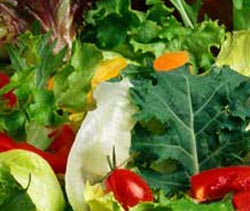Vitamin K

Function
Vitamin K is necessary for the production of prothrombin, a compound critical for blood clotting. It is also essential for bone formation and repair. Vitamin K also plays a role in the intestines converting glucose into glycogen for storage in the liver.
Sources
Vitamin K is found in asparagus, blackstrap molasses, broccoli, Brussels sprouts, cabbage, cauliflower, dark green leafy vegetables, egg yolks, liver, grains, soybeans, yogurt, and some herbs including alfalfa. Most of the body’s vitamin K however, comes from synthesis by the probiotic bacteria found in the small intestines.
Deficiency
Unless there is a depletion of the normal intestinal probiotic bacteria, vitamin K deficiency is rare.